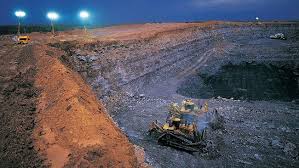Former US vice-president Al Gore and his partner at Generation Investment Management, David Blood, wrote recently that the economic case for divesting from coal was as compelling as the environmental and moral arguments. In Whitehaven Coal, Greenpeace have a company that validates this argument beautifully.

Whitehaven’s Maules Creek coal mine is one of Australia’s most controversial fossil fuel projects. Involving bulldozing of half the Leard State Forest near Narrabri, home to several threatened and endangered species, Maules Creek has been met with opposition from farmers, traditional owners, environmentalists and a growing cross-section of the community. A two-year blockade on site has seen doctors, religious leaders, and even former coal industry workers take peaceful civil disobedience to prevent the project.
Two weeks ago, Greenpeace launched a campaign on Sydney University, calling for them to divest their $1 million stake in Whitehaven. Similar to the fossil fuel divestment campaigns enjoying success in the US, Greenpeace is leaning on the moral and environmental arguments as to why a leading institution should keep its money out of environmentally damaging investments.
Sydney Uni’s response so far is impressive. They have committed to not make any further investments in Whitehaven, or coal more broadly while they review their investment policies. I’m sure they understand the moral argument against investing in a company actively destroying koala habitat to build a new coal mine when climate scientists are calling for rapid reductions in greenhouse gas emissions. But I can’t help but feel as though the money managers have also taken a look at this investment and seen a compelling economic case to end coal investments.
Whitehaven Coal is a pure play coal miner and its financial performance over the last couple of years has been in step with coal companies elsewhere in Australia, the US and China, where share prices are typically down 50-70% over the past couple of years. Whitehaven share price has been hovering well below $2 recently, down from $7 per share in January 2011.
Both thermal and coking coal prices are well down from their highs of 2011 and while demand is tapering off, the coal industry remains contractually obliged to feed a beast that isn’t hungry. This hasn’t been any good for the environment, nor has it done much good for investors in coal.
But Sydney Uni? One million dollar stake? Surely that’s just the thin end of the wedge. And although the university’s investment managers won’t look back fondly at Whitehaven’s stock price chart, I can only imagine how a major fund manager such as Farallon Capital Management will feel. They will have lost about a quarter of a billion dollars on their stake in Whitehaven since January 2011 as the share price has slumped.
It certainly puts the antics of Jonothan Moylan into perspective. Moylan grabbed headlines in January 2012 with a hoax media release from ANZ, stating that the bank was cancelling a $1.2 billion loan to Whitehaven for the Maules Creek mine. Moylan recently received a 20-month sentence, suspended for two years for this action that caused a temporary dive in Whitehaven’s share price. Looking back, Moylan was probably doing Whitehaven investors a favour.
Take the Farallon Capital Management. Had they been spooked by Jono’s hoax and sold their stock at the bottom of the temporary dip in share price, they would have lost $18 million. Instead, they held onto their stake, which has since lost about $150 million in value.
Investors may have been holding on to their coal shares in recent years expecting a rebound in the market. But just as investors have been slow in recent years to recognise and adapt to the slump on the coal market, they may be making the same mistakes now, failing to spot signs of a structural decline in coal, at least the thermal variety; China’s policies to bring down air pollution and introduce carbon pricing, India increasing coal taxes to fund renewables and now planning a 10 gigawatt per year rollout of wind capacity, and a steady decline in US coal exports and domestic production all mean something.
An increasing number of analysts and investment banks are recognising that coal is in structural decline. Fund managers are cottoning on too. I’ve spoken to one – a former Whitehaven investor in fact – who just doesn’t see coal as a viable investment any more.
For other investors in Whitehaven? They might want to pay close attention to Greenpeace’s campaign. If it spreads beyond iconic investors such as Sydney Uni to large fund managers, some difficult and embarrassing questions are going to be asked of their morals and professional credentials.
Julien Vincent is the lead campaigner for Market Forces










